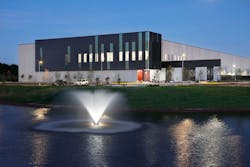DCF Show: Equinix VP of Colocation Tiffany Osias Talks AI, Liquid Cooling, Hybrid and Multi-Cloud Architecture, Sustainability
For this episode of the Data Center Frontier Show Podcast, DCF editors Matt Vincent and David Chernicoff chat with Tiffany Osias, VP of Colocation for Equinix.
Osias begins by discussing the company's investment in a range of data center innovations to help its customers enter new markets and gain competitive advantages through burgeoning AI and machine learning tools.
In the discussion, we also learn about Equinix's deployment of closed loop liquid cooling technologies in six data centers in 2023, and where the company stands on offering increased rack densities for powering AI workloads.
Osias also discusses developments along the course of Equinix helping its customers to optimize their hybrid cloud and multi-cloud architectures and strategies.
Data center sustainability also factors into the conversation, as Osias touches on how Equinix aims to achieve 100% renewable energy coverage by 2030.
Released just this month, the following video describes and illustrates the Equinix strategy for implementing data center sustainability solutions:
In a statement accompanying the video, the company observes how:
"In today’s business landscape, sustainability is not just a trend but a decisive factor influencing customer choices. This evolution goes beyond voluntary commitments. The EU is leading the way with new regulatory frameworks like the EU Taxonomy for Sustainable Finance and the Corporate Sustainability Reporting Directive (CSRD). With these pressures at play, it’s imperative for enterprises to evaluate and report their greenhouse gas emissions from business operations—including those stemming from IT operations. It’s time to act."
Podcast Timeline
Here's a timeline of key discussion points in our podcast interview with Equinix VP of Colocation, Tiffany Osias:
- 1:09 - Osias explains how Equinix invests in data center innovation to help its customers enter new markets, contain costs, and gain a competitive advantage, especially as AI and machine learning become more prevalent in decision-making processes.
- 1:50 - The discussion turns to how Equinix enables its customers' use of AI by providing secure, reliable service and efficient cooling options, including advanced liquid cooling technologies.
- 4:07 - Osias remarks on how Equinix plans to deploy closed loop liquid cooling in six data centers in 2023 to meet increasing demand from customers for full liquid-to-liquid environments.
- 5:49 - We learn how Equinix offers high-density racks for customers running 10-50+ kW per rack, and provides a bespoke footprint for each customer based on their power consumption needs and cooling capabilities.
- 7:14 - Osias remarks on how liquid cooling can have a positive impact on data center sustainability by reducing physical footprint, carbon emissions from manufacturing, and improving cooling efficiency. The company's use of renewable energy is also examined.
- 10:19 - Osias describes how AI impacts the Equinix approach to data center infrastructure, and the importance of partnerships and interconnection strategies.
- 12:09 - Osias discusses how Equinix aims to achieve 100% renewable energy coverage by 2030 and has made progress towards that goal.
- 13:21 - Notes on how Equinix helps customers optimize their hybrid multi-cloud architecture and interconnect with cloud and storage providers.
Interview Highlights: Tiffany Osias, VP of Colocation, Equinix
Here are select transcript highlights from DCF's podcast interview with Equinix VP of Colocation, Tiffany Osias:
Data Center Frontier: What is Equinix's approach to critical innovations such as liquid cooling, in response to increasing AI demands in the data center and its impact on infrastructure, including current on-the-ground strategies being executed right now by Equinix that can help enterprises to be future-ready?
Tiffany Osias, Equinix: It's great that you're asking about innovation, because one of our principles is to innovate with and for customers. It's why we continue to invest and grow the way that we do.
We spend $3 billion in organic investments each year to put ourselves in a position to be able to deliver for our customers through adding new locations, entering new markets, putting new services on the platform, and enabling them to do things like enter new markets, cost containment, and come up with competitive advantages.
As you can imagine, in order for companies to do that, it takes a whole bunch of data. This is why I think AI is becoming such a hot topic right now, because the access to data is so much more prolific now than it was even five years and certainly ten years ago.
As customers are using more data to make decisions about where to expand, who to sell to, and how to optimize costs, they're using AI and machine learning to help make these decisions. There are a whole host of things that go along with thinking about AI for an organization.
The way that Equinix helps enable that for customers is by, of course, giving them the same secure, reliable service that they're used to today by putting their equipment within Equinix, but also coming up with new ways to cool it. Because these boxes that do high performance compute require a lot more power, and with more power, require better and more efficient ways to cool.
Data Center Frontier: We've read recently that Equinix plans to deploy closed loop liquid cooling in six data centers this year. Are there any other updates regarding the company's use of liquid cooling technologies?
Tiffany Osias, Equinix: Our customers have been asking us to innovate more in this area. We're just seeing so much more demand.
Late last year, we put our own Metal infrastructure services in liquid cooling. We were really running production environments in liquid cooling, with other customers starting to dabble as well.
Many of the customers that have been dabbling in this over the last few years with us have been doing so with rear door heat exchange technology with a self contained closed loop system.
Now we're seeing customers want to move from that into a full liquid-to-liquid environment. We'll be taking on putting the architecture in place for these customers, and letting them bring their liquid cooling enabled direct-to-chip equipment into Equinix in locations across EMEA, Americas and AP.
That's happening here in 2023, and it's really like an enterprise-available solution for those customers that are more architecturally advanced.
Data Center Frontier: We see that you are a partner with AWS and Google and Microsoft, in terms of providing more efficient access to their networks. When you work with any of those or exterior vendors, do you step away and let the customer deal with the vendor directly, or are you an intermediary per se? Are you providing the kind of support that the customer needs to determine which of those services work best?
Tiffany Osias, Equinix: We find that a lot of our customers do have a hybrid multi-cloud architecture, meaning that they use multiple cloud operators, and in some cases one or a few data storage providers, meaning customers might have their storage located with GreenLake at Equinix, but then they might use some cloud for computing purposes. They might have some with AWS and some with Microsoft, some with Google.
Also released this month, the following video from Equinix explains how data center customers can learn how to navigate cloud complexities and smooth migration roadmaps via the company's Telstra Hybrid Cloud platform.
Driven by Equinix, the Telstra platform enables "a fully managed hybrid cloud deployment solution to protect business-critical workloads while accelerating digital transformation," as stated by the company.
Tiffany Osias, Equinix: (quote continues) So customers do already typically have that kind of architecture. What we do is help them figure out how to optimize that architecture, and how to take that storage that now sits within Equinix and be able to interconnect with those cloud operators, either through a physical interconnection circuit, an actual cable, or through our Fabric platform, which allows them to then have a logical connection into those cloud providers.
We do certainly talk to them about the best way for them to architect that within Equinix, but we find that many of them are using multiple providers.
About the Author
Matt Vincent
A B2B technology journalist and editor with more than two decades of experience, Matt Vincent is Editor in Chief of Data Center Frontier.




